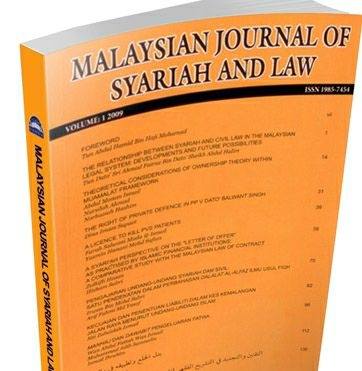KONSEP PENGAWASAN MORAL DAN HAK ASASI MANUSIA: TINJAUAN MENGIKUT PERUNDANGAN SYARIAH
The Concept of Moral Surveillance and Human Rights: An Overview from the Shariah Law
DOI:
https://doi.org/10.33102/mjsl.vol5no2.65Keywords:
Hak asasi manusia, pengawasan moral, perundangan syariahAbstract
This study investigates the concept of moral surveillance and human rights in accordance with the Shariah law and its significance to the Muslims, particularly in Malaysia. Furthermore, this study seeks to rectify the misinterpretation of the factual meaning of moral surveillance. It is also to disprove the allegation that this concept contravenes the rights of human beings, and hence should not be enforced in the society. The notion of human rights is accepted by most people on earth. Human rights are indispensable elements of life that must be preserved to ensure justice and harmony in a societal life. As a religion encompassing all aspects of life, Islam elevated human rights in various ways by outlining comprehensive laws to protect the human life in various circumstances. These laws include moral and ethical codes. This study adopted the descriptive qualitative method. Analyses were conducted on writings of the past and recent scholars on the issues of moral surveillance and human rights. This study concluded that moral surveillance outlined by Shariah law is in line with the notion of human rights. In fact, the concept of moral surveillance in Islam if implemented is able to preserve the harmonious life of the society and the nation.
Downloads
References
Ahmad bin Hanbal. (2001). Musnad al-Imam Ahmad bin Hanbal. Tahkik: Syuaib al-Arnaut, Beirut: Muassasah al-Risalah.
Al-‘Amir, Ahmad bin Abdul Aziz. (2012). Al-Islam awwalu man karrama al-insan wa a‘tohu huquqahu. Al-Bayan. http://www.albayan.co.uk/Article2.aspx?id=1806 [14 September 2017].
Al-Asbahani, Abu Nu‘aim Ahmad bin Abdullah. (1988). Hilyatul auliya’ wa tabaqat al-asfiya’. Beirut: Dar al-Kutub al-‘Ilmiyyah.
Al-Baihaqi, Abu Bakr Ahmad bin Husain. (2011). Al-Sunan al-kabir. Tahkik: Abdullah bin Abdul Muhsin al-Turki. Jizah: Hajr.
Al-Bukhari, Abu Abdullah Muhammad bin Ismail. (1996). Al-Adab al-mufrad. Ed. ke-2, Beirut: Muassasah al-Kutub al-Thaqafiyyah.
Al-Ghazali, Muhammad Abu Hamid. (1994). Ihya’ ‘ulum al-din. Beirut: Dar Ihya’ al-Turath al-‘Arabi.
Al-Ghazali, Muhammad. (2005). Huquq al-insan baina ta‘alim al-Islam wa i‘lan al-umam al-muttahidah. Ed. ke-4. Kaherah: Nahdhah Misr.
Al-Maududi, Abu Al-A‘la. (1993). Human rights in Islam. Leicestershire: The Islamic Foundation.
Al-Nawawi, Muhyiddin Abu Zakaria Yahya bin Syaraf. (2015). Riyadh al-solihin. Ed. ke-7. Jeddah: Dar al-Minhaj.
Al-Zuhaili, Wahbah. (1998). Usul al-fiqh al-Islami. Jil. 1. Damsyik: Dar al-Fikr.
Anon. (2005). Stop the policing of morality, say NGOs. The Star, 23 Mac. http://www.thestar.com.my/news/nation/2005/03/23/stop-the-policing-of--morality-say-ngos/#s2cbWXq4KU9xy11h.99 [13 September 2017].
Anon. (2016). Piagam Madinah. http://ms.wikipedia.org/wiki/Piagam_Madinah [13 September 2017].
Anon. 4 September 2017. Hak asasi manusia. http://ms.wikipedia.org/wiki/Hak_asasi_manusia [13 September 2017].
Fagan, Patrick F. (1999). How broken families rob children of their chances for future prosperity. The Heritage Foundation. http://www.heritage.org/marriage-and-family/report/how-broken-families-rob-children-their-chances-future-prosperity [13 September 2017].
Fariq Gasim Anuz. (2002). Bengkel akhlak. Jakarta: Darul Falah.
Hammudah Abdalati. 1998. Islam in focus. Petaling Jaya: Islamic Book Trust.
Haron Din et. al, (2001). Manusia dan Islam. Jil. 1&2. Kuala Lumpur: Dewan Bahasa dan Pustaka.
Ibn Kathir, Ismail bin ‘Umar al-Dimasyqi. (1999). Al-bidayah wa al-nihayah. Tahkik: Abdullah bin Abdul Muhsin al-Turki. Jil. 9. Jizah: Hajr.
Ibn Manzur, Abu al-Fadhl Jamaluddin bin Muhammad. (1990). Lisan al-‘Arab. Beirut: Dar al-Sadir.
Jamal Badawi. (2010). Moral teachings in Islam, main ethical questions. http://www.jamalbadawi.org/index.php?option=com_content&view=article&id=85:61-moral-teachings-in-islam-main-ethical-questions&catid=18:volume-6-moral-teachings-of-islam [13 September 2017].
Keene, Michael. (2002). World religions. Oxford: Lion Publishing plc.
Khurram Murad. (2003). Shariah: the way of justice. Leicestershire: The Islamic Foundation.
Mahfudzah Mohamad. (2015). Lesbian, gay, biseksual dan transgender: perspektif undang-undang jenayah syariah. Jurnal Undang-undang dan Masyarakat 19: 29-36.
Nasimah Husin et.al. (2007). Undang-undang Islam: jenayah keterangan dan prosedur. Jil. 13. Kuala Lumpur: Dewan Bahasa dan Pustaka.
Shad Saleem Faruqi. (2001). The human rights and constitutional perspective. INSAF – The Journal of the Malaysian Bar (special issues on freedom of religion): 24.
Shazwan Mustafa Kamal. (2015). LGBT community will never have equal rights in Malaysia, tourism minister says. Malay Mail Online, 11 September. http://www.themalaymailonline.com/malaysia/article/lgbt-community-will-never-have-equal-rights-in-malaysia-tourism-minister-sa [13 September 2017].
Women’s Aid Organisation. (2005). The state has no role in policing morality. http://www.wao.org.my/backup_v1_21.7.2011/news/20050103moral.htm [13 September 2017].
Zaydan, Abdul Karim. (1998). Nizam al-qadha’ fi al-syari‘ah al-Islamiyyah. Beirut: Muassasah al-Risalah.

Downloads
Published
Issue
Section
License

This work is licensed under a Creative Commons Attribution-NonCommercial 4.0 International License.














































